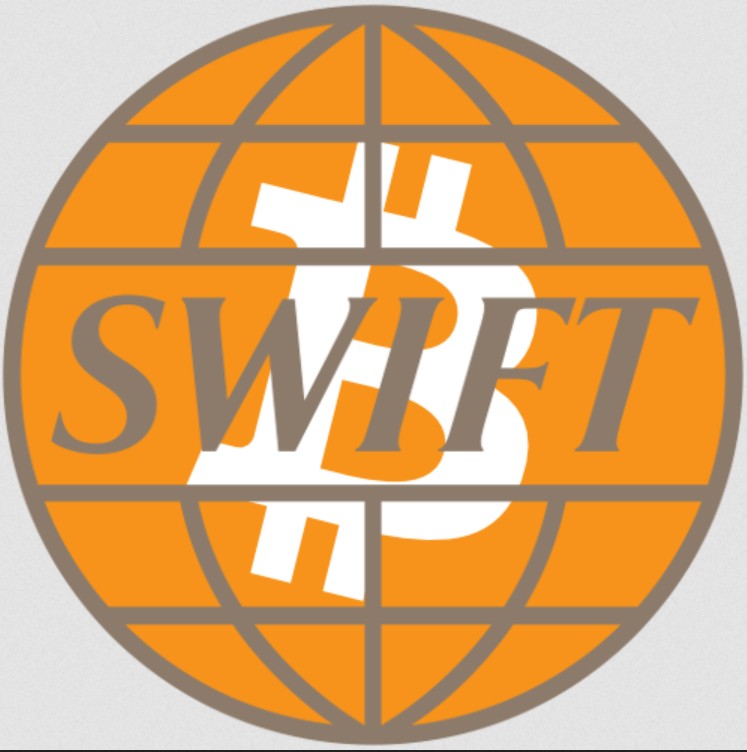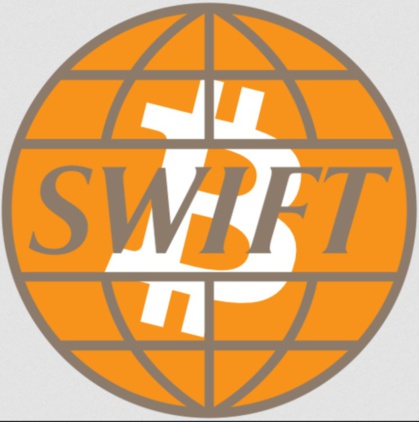Russia launched an all-out attack on Ukraine this Thursday, changing the face of Europe forever. Since every day is marked with new sanctions against Russia, the latest was on Saturday when key Russian banks were banned from the Swift financial system. The ban from Swift is sometimes called “the nuclear option,” and would curtail Russian banks’ access to foreign liquidity in the form of the world’s major currencies such as dollars, euros, or yen. While it did not happen in the past, Russia was threatened with a Swift expulsion in 2014 when it annexed Crimea. It would be naive to think that the threat didn’t prompt Russia to examine all the possible what-ifs in preparation for such a scenario and develop its own alternatives to counter a future expulsion from Swift. Russia has one of the largest foreign currency and gold reserves in the world. They were the fourth largest behind China, Japan, and Switzerland at the end of 2020, with $600+ billion in foreign currencies and gold. The Central Bank of Russia developed its own Swift equivalent, SPFS, which is used by around 400 institutions, mostly banks, and it only works within Russia. SPFS is extremely limited, it’s only operational during weekday working hours and its messages are limited to 20 kilobytes in size. But there have been reports to integrate the network with payment systems in China and India and expand it to countries like Turkey and Iran. Russia has also been working on its own central bank digital currency (CBDC) in an effort to give its domestic banks international liquidity should expulsion from Swift ever materialized. Now there’s talk of Russia using crypto as an escape route to circumvent sanctions. Is this realistic and how would that even work?
There are lots of networks out there for transactions and payments today. There are also many new contenders emerging from the fintech world.
A number of countries, including China, Russia, and Iran, have taken steps to limit their dependence on the dollar and have even been working to establish alternative payment systems. China has created its own Cross-Border Interbank Payment System (CIPS).
The US threatened to lock China out of the dollar system if it failed to follow UN sanctions on North Korea. In 2012, with the help of an EU directive, Swift blocked Iran, to contain its nuclear program.
Removing Russia from Swift would certainly cripple its economy, but it’s no magic bullet. There are alternative ways to operate outside of Swift, and it’s important to stay focused on the money, not the messaging system.
The US government is increasingly aware of the potential for cryptocurrencies to lessen the impact of sanctions and is stepping up its scrutiny of digital assets.
For thirteen years now, we’ve had bitcoin, an open technology that has more computing power behind it, on a decentralized basis, than any open source project in history.
Russia may be able to alleviate some of the pains from the sanctions with cryptocurrencies. But, evading sanctions isn’t as simple as it sounds, given the crypto market’s volatility and advanced tools to track crypto. A few days ago, Laura Shin published an article about a powerful de-mixing tool that uncovered the identity of Ethereum’s 2016 DAO hacker. Also, if Russia was to adopt bitcoin, it could threaten the already battered ruble.
Theoretically, it could lessen the impact of the sanctions by turning to bitcoin mining. This is a path that Iran followed, another oil producer. Iran has a surplus of energy it can’t export, so it’s using it to power bitcoin mining, which consumes electricity and rewards miners with bitcoin.
A 2021 report from Elliptic revealed that Iran’s power company disclosed that up to 600 MW of electricity was used by bitcoin miners. The report estimates that Iran-based miners account for approximately 4.5% of all bitcoin mining, which translates to annualized revenue of close to $1 billion. To some degree, this allows Iran to circumvent trade embargoes and use the revenues from cryptocurrencies to buy imports.
Could Russia use crypto to reduce the impact of sanctions? It will certainly try to reduce the pain using crypto.
A Bloomberg report says that Russians own about 12% of the total global crypto holdings.
The Bank of Russia is accelerating efforts on developing a CBDC. According to a white paper published by the bank, trials are expected to begin in January. In the second stage of trials, expected by mid-2022, the Bank of Russia is expected to invite non-banking partners such as exchanges and credit institutions to the network.
On February 18, Russia’s ministry of finance introduced a cryptocurrency bill in parliament, pushing forward to legalize crypto investments and hinting that Russians will be allowed to mine cryptocurrencies like bitcoin, but banning their use for payments.
We are entering a new world, in which the dollar is eventually going to lose its global dominance, yet I don’t see a contender (ruble, yuan, etc.) becoming the world’s next global reserve currency.
Bitcoin will be the money in the future. So, the next best option to being the country that issues and distributes the global reserve currency is to be the most advanced country and holder of the global reserve currency that no one controls.
Countries that prepare and attain a large ownership stake, build mining operations, and support pro-bitcoin activities, will have a significant advantage in this new world.
What is abundantly clear is that Putin and Russia have had eight years to figure out how to circumvent this very sanction and have gamed it out extensively. I don’t think we are going to see crypto replace Swift as a way around sanctions, despite what everyone seems to be suggesting. We will see Russia positioning in a crypto land grab for the post-dollar era.
There are lots of networks out there for transactions and payments today. There are also many new contenders emerging from the fintech world.
A number of countries, including China, Russia, and Iran, have taken steps to limit their dependence on the dollar and have even been working to establish alternative payment systems. China has created its own Cross-Border Interbank Payment System (CIPS).
The US threatened to lock China out of the dollar system if it failed to follow UN sanctions on North Korea. In 2012, with the help of an EU directive, Swift blocked Iran, to contain its nuclear program.
Removing Russia from Swift would certainly cripple its economy, but it’s no magic bullet. There are alternative ways to operate outside of Swift, and it’s important to stay focused on the money, not the messaging system.
The US government is increasingly aware of the potential for cryptocurrencies to lessen the impact of sanctions and is stepping up its scrutiny of digital assets.
For thirteen years now, we’ve had bitcoin, an open technology that has more computing power behind it, on a decentralized basis, than any open source project in history.
Russia may be able to alleviate some of the pains from the sanctions with cryptocurrencies. But, evading sanctions isn’t as simple as it sounds, given the crypto market’s volatility and advanced tools to track crypto. A few days ago, Laura Shin published an article about a powerful de-mixing tool that uncovered the identity of Ethereum’s 2016 DAO hacker. Also, if Russia was to adopt bitcoin, it could threaten the already battered ruble.
Theoretically, it could lessen the impact of the sanctions by turning to bitcoin mining. This is a path that Iran followed, another oil producer. Iran has a surplus of energy it can’t export, so it’s using it to power bitcoin mining, which consumes electricity and rewards miners with bitcoin.
A 2021 report from Elliptic revealed that Iran’s power company disclosed that up to 600 MW of electricity was used by bitcoin miners. The report estimates that Iran-based miners account for approximately 4.5% of all bitcoin mining, which translates to annualized revenue of close to $1 billion. To some degree, this allows Iran to circumvent trade embargoes and use the revenues from cryptocurrencies to buy imports.
Could Russia use crypto to reduce the impact of sanctions? It will certainly try to reduce the pain using crypto.
A Bloomberg report says that Russians own about 12% of the total global crypto holdings.
The Bank of Russia is accelerating efforts on developing a CBDC. According to a white paper published by the bank, trials are expected to begin in January. In the second stage of trials, expected by mid-2022, the Bank of Russia is expected to invite non-banking partners such as exchanges and credit institutions to the network.
On February 18, Russia’s ministry of finance introduced a cryptocurrency bill in parliament, pushing forward to legalize crypto investments and hinting that Russians will be allowed to mine cryptocurrencies like bitcoin, but banning their use for payments.
We are entering a new world, in which the dollar is eventually going to lose its global dominance, yet I don’t see a contender (ruble, yuan, etc.) becoming the world’s next global reserve currency.
Bitcoin will be the money in the future. So, the next best option to being the country that issues and distributes the global reserve currency is to be the most advanced country and holder of the global reserve currency that no one controls.
Countries that prepare and attain a large ownership stake, build mining operations, and support pro-bitcoin activities, will have a significant advantage in this new world.
What is abundantly clear is that Putin and Russia have had eight years to figure out how to circumvent this very sanction and have gamed it out extensively. I don’t think we are going to see crypto replace Swift as a way around sanctions, despite what everyone seems to be suggesting. We will see Russia positioning in a crypto land grab for the post-dollar era.

Ilias Louis Hatzis
Ilias Louis Hatzis is the Founder & CEO at Mercato Blockchain Corporation AG.
Ilias Louis Hatzis is the founder and CEO at Kryptonio wallet. Create your wallet in less than a minute, without seed phrases, private keys, passwords or documents. Keep your bitcoin and digital assets always secure and recoverable: https://kryptonio.com
I have no positions or commercial relationships with the companies or people mentioned. I am not receiving compensation for this post.
Ilias Louis Hatzis is the founder and CEO at Kryptonio wallet. Create your wallet in less than a minute, without seed phrases, private keys, passwords or documents. Keep your bitcoin and digital assets always secure and recoverable: https://kryptonio.com
I have no positions or commercial relationships with the companies or people mentioned. I am not receiving compensation for this post.
Autres articles
-
Visa finalise l'acquisition de Featurespace
-
Tether investit dans StablR pour promouvoir l'adoption du stablecoin en Europe
-
Chainalysis acquiert Hexagate, fournisseur de solutions de sécurité WEB3
-
Nomination | Esker annonce la nomination de Dan Reeve en tant que membre du Comité Exécutif
-
Un montant de 1,8 million de dollars levé - La nouvelle ICO de Dogizen étonne les experts avec une approche inédite au monde







